

Updated February 24, 2026
AI is ushering in a new digital era, and you don’t want to be left behind.
ChatGPT drove AI popularity faster than anyone could have anticipated. At the onset of 2023, it broke the record for fastest user growth, reaching 100 million users in its first two months post-launch.
AI zeal is also present on Clutch — demand for AI development services on Clutch grew 514% YoY in the first quarter of 2023 and continues to rise.
Looking for a Software Development agency?
Compare our list of top Software Development companies near you
Almost all small business (82%) leaders anticipate that AI will disrupt their operations in the next few years, and many think that AI will completely transform their businesses in that time.
Despite the potential upheaval that comes with change, businesses’ top three feelings on AI are excitement, optimism, and motivation. Enthusiasm about the value of AI is driving massive adoption rates and even encouraging businesses to invest more in outsourcing to scale alongside new tech.
Clutch surveyed 502 US small business leaders to learn more about how businesses are adapting to AI, the problems they’re solving with generative AI solutions, and their expectations for the future.
Don’t fall behind your peers — use our findings to uncover the secrets to AI success and stay competitive as AI drives the future of work.
From streamlining customer service to automating mundane tasks, AI is already changing workplaces everywhere.
Small businesses are far from immune to this trend — eighty-four percent (84%) of those currently using AI plan to keep up their usage into the future.
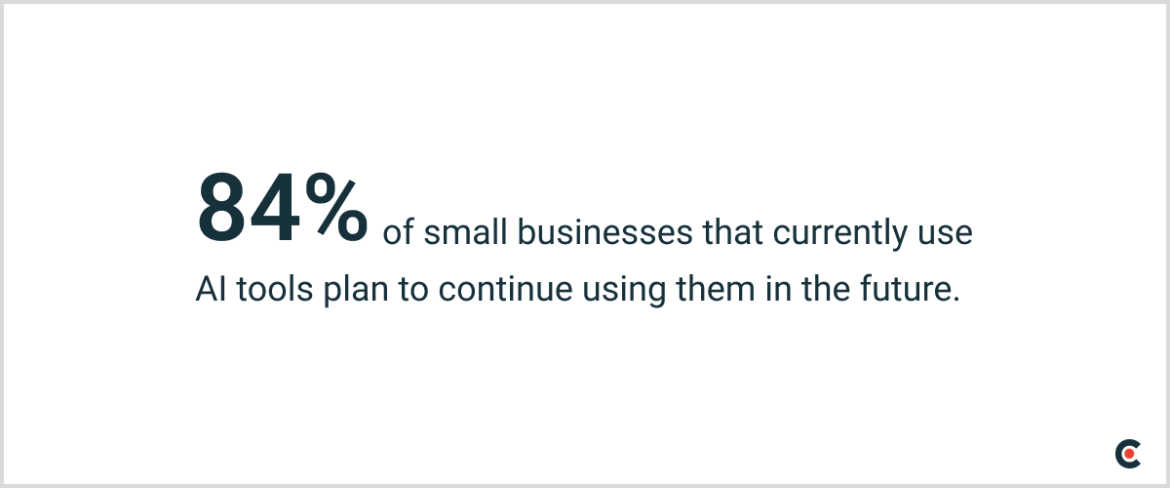
What’s driving sky-high retention? For many business leaders, the answer is simple: AI produces undeniable results.
Take Adrian Tamminga, for instance. As co-founder of outdoor fire pit manufacturer Iron Embers, Tamminga uses AI for work every day. The result: a more productive work life that promotes continual learning.
“Tasks that used to take weeks and involve multiple team members can now be completed in a single morning. As I use AI to accomplish intimidating tasks, I also gain knowledge and expertise in various fields.” – Adrian Tamminga, Iron Embers
One common fear skeptics have about AI tools is that they hinder learning and creativity, but in this small business leader’s case, AI increases access to new information and makes it easier to learn.
So far, Tamminga has implemented AI tools in the company’s IT and marketing departments, commending their ability to do everything from troubleshooting ERP issues to analyzing ad copy performance.
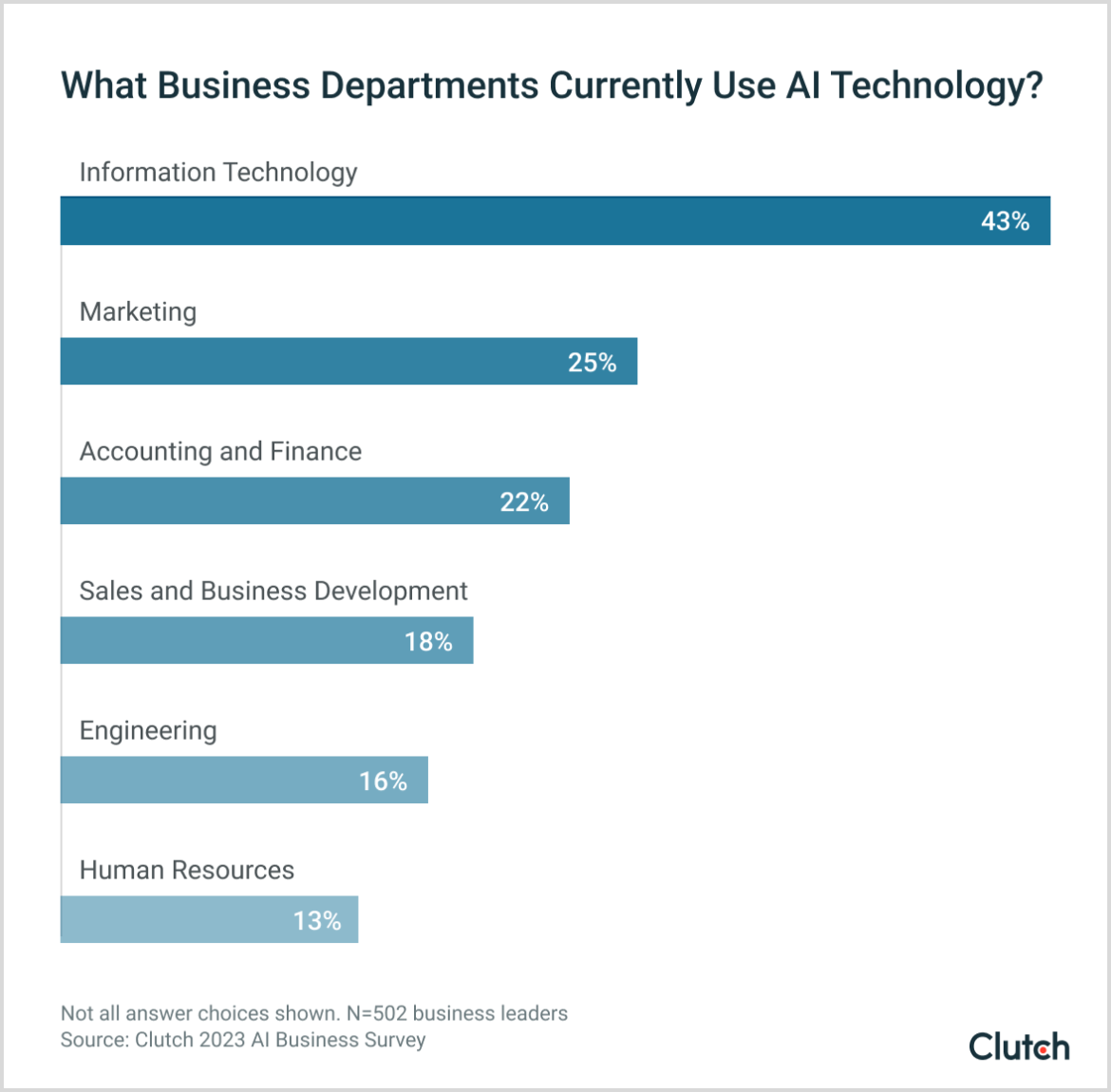
Tamminga isn’t the only one zeroing in on AI for IT and marketing tasks. Small businesses that currently use AI technology are most commonly doing so within their IT and marketing departments.
This doesn’t come as a surprise, especially after the huge spike in AI popularity brought on by ChatGPT. Many of the AI use cases early adopters promoted were marketing and tech-oriented, namely ChatGPT troubleshooting code and writing marketing materials.
ChatGPT’s record-setting adoption introduced many people to generative AI tools for the first time, so it’s sensible that these use cases were adopted first and en masse.
While new use cases are still developing, small businesses are coming to recognize some of the diverse capabilities of AI. Among the areas where they see AI as particularly effective include chatbot development, creating business presentations, and writing marketing collateral.
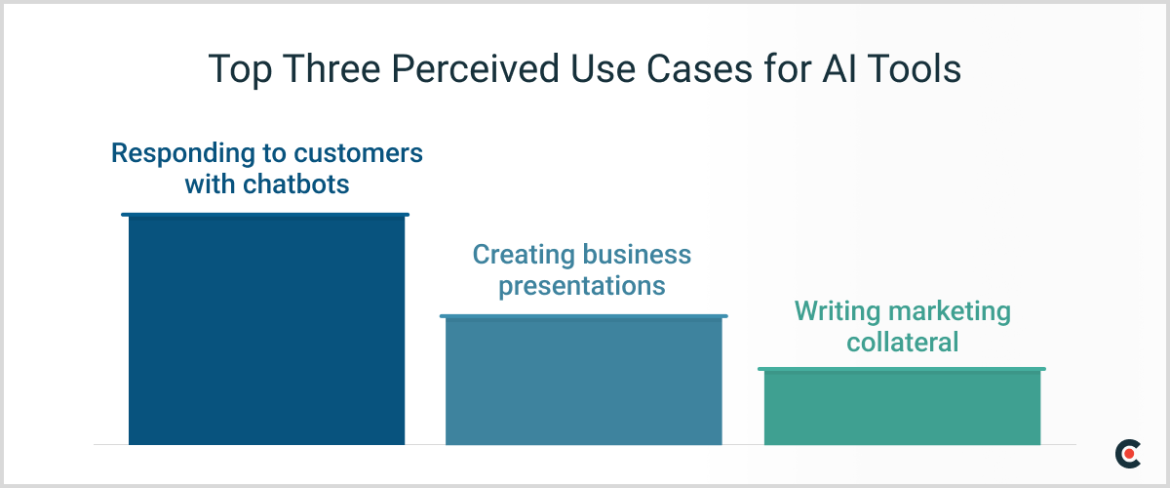
Here’s how engaging with AI tools may look in each of these efforts:
In all of these cases, AI helps businesses get work done faster. The efficiency of AI tools is its most popular benefit among survey respondents.
One of these business leaders is Ryan Stone, founder and creative director of the video production company Lambda Films. Stone’s company tried AI tools to support its scriptwriting process and was highly satisfied with the results.
“Ultimately, [AI] saved a huge amount of time and allowed for a stress-free creation process. It excelled at providing accurate information for the script and gave us confidence during the writing process.” – Ryan Stone, Lambda Films
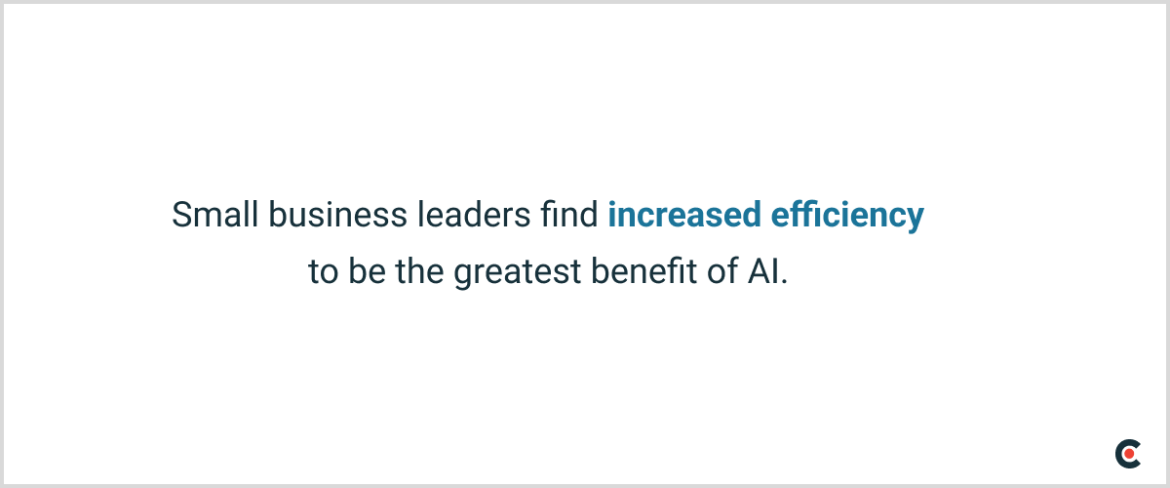
The increased efficiency of the AI-supported writing process reduced the stress of preparing a script and proved to be a reliable source of content creation. Stone and many others lean on AI to streamline processes and generate ideas quickly.
While efficiency is the main driver of small business interest in AI, companies are split on AI’s greatest limitation.
Most companies are primarily concerned about either lack of personalization in generative AI responses or the responses being detected as non-human.
These challenges are rooted in the immaturity of learning models, which can lead to AI-generated content being very easy to spot as non-human without thorough prompts and guidance to train its replies. AI-generated content being easy to identify can be a big issue for businesses intending to use it for highly creative or personalized work.
Ann Handley, chief content officer at MarketingProfs, agrees that AI will never understand a business better than its team. Handley cautions small businesses from over-relying on AI for this reason.
“Businesses should be viewing AI as a resource, not a role replacement. You won’t get real business insights from AI that will ever replace your own creative problem-solving and insightful thinking.” – Ann Handley, MarketingProfs
It’s critical to keep the advantages and disadvantages of AI-driven processes in mind before making final decisions on how and where new tech should be implemented.
While not every small business has been an early adopter of AI, the vast majority recognize how significant the technology will be for the workplace and are considering how it will impact their own operations.
Eighty-two percent (82%) of survey respondents believe AI will disrupt their business over the next 5 years.
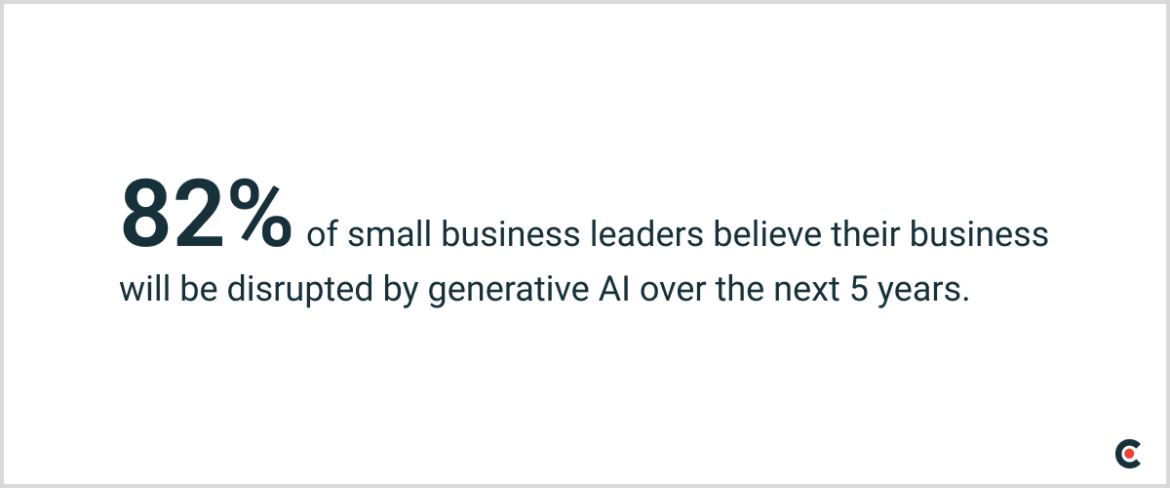
Of that group, the most common expectation was that AI will completely transform their businesses in the next 5 years.
Even in unexpected industries, like home remodeling, AI tools are becoming pervasive. Rick Berres, owner of Minneapolis home services company Honey-Doers, has been in the business for decades and was initially skeptical of AI.
“When people started talking about AI, I didn’t pay much attention because I figured it wouldn’t apply to us — we work with our hands, right?”
That was until he was introduced to an AI tool that can generate different interior design options for a space instantly.
“[It was] a really fascinating application that I hadn’t considered before. It can potentially be hugely helpful to us in renovation because the potential is endless.”
Berres points out that the remodeling AI isn’t perfect yet — due to lighting inaccuracies and limited styles — but he anticipates the tool will be “very powerful” as the technology develops further.
Berres’s sentiment aligns with other small business owners that have tried an AI tool. The versatility and efficiency of the tools dispel initial skepticism, but most can agree that there’s plenty of room for improvement.
Still, it’s impossible to ignore the speed at which AI solutions are developing. It’s not far-fetched for businesses to be expecting AI-driven transformation in the near term.
The rapid developments in AI technology are energizing and impressing businesses everywhere. Overall, small business sentiment on AI is fiercely positive; most leaders shared that they are excited, optimistic, or motivated about the current state of AI.
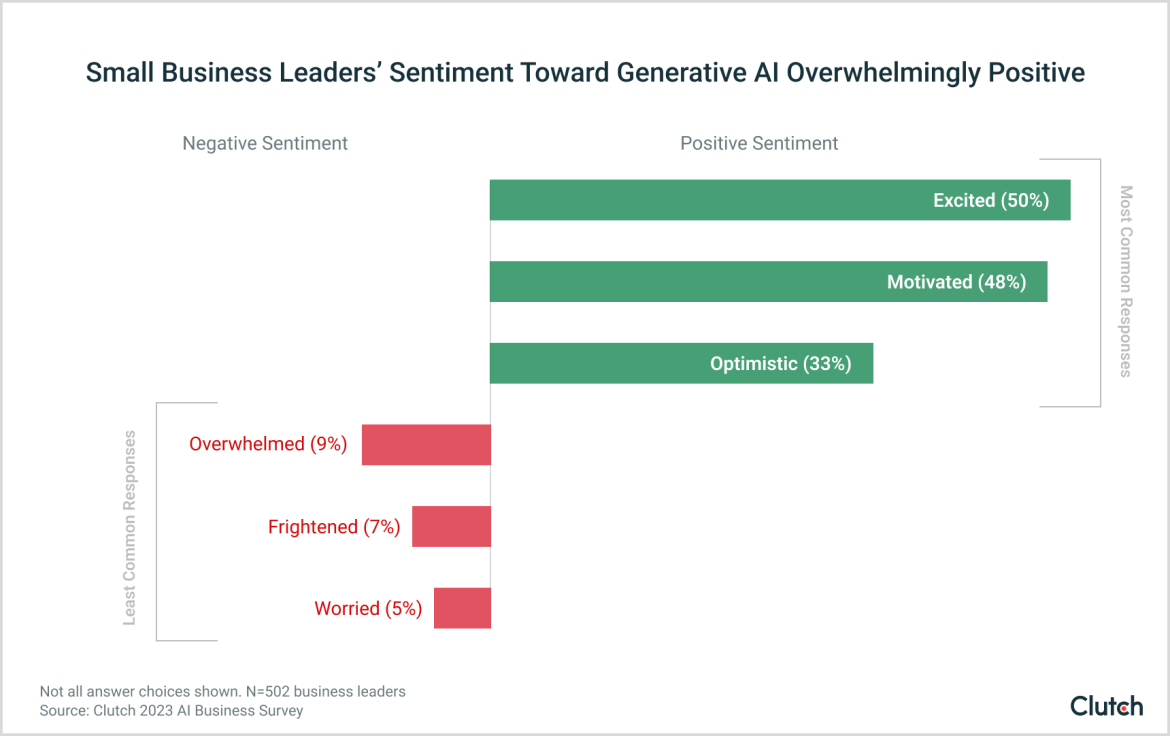
Very few respondents expressed negative feelings outside of healthy skepticism, which can only be expected from new and permeating tech.
Small businesses are starting to put their enthusiasm for new AI tools into action. Once they’ve adopted AI, companies expect to need a sizable increase in outsourced services across functional departments.
A majority of small business leaders anticipate AI increasing their need for outsourced services in engineering, sales and business development, marketing, IT support, HR, and accounting and finance.
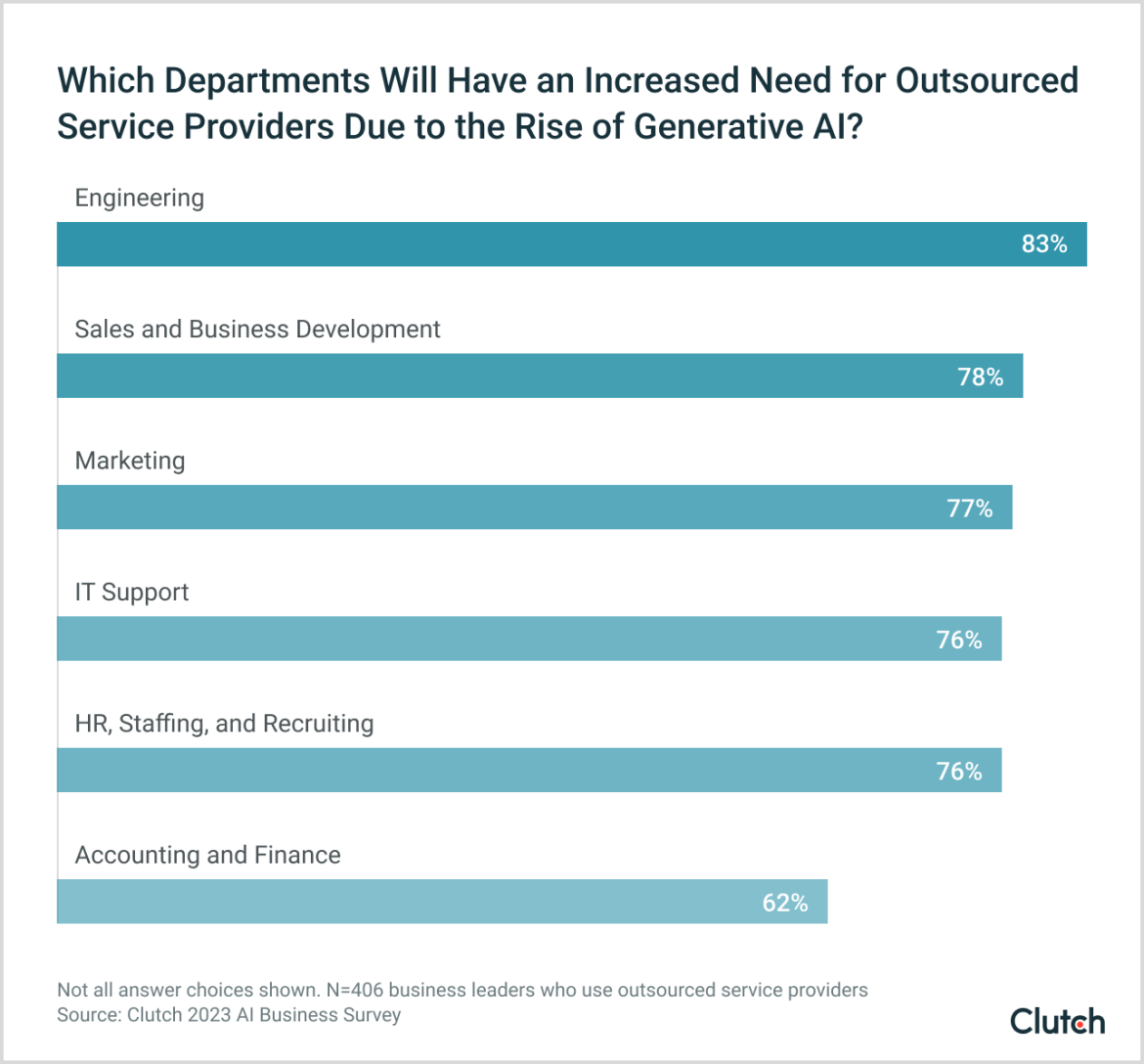
Increased AI use and contracts with outsourced service providers mean that small businesses are aiming to use tech to scale. Helen Yu, founder & CEO of Tigon Advisory Corp., highlights the massive shift in staffing that will result from AI.
“AI will continue to automate business processes over the next decade, especially in the area of digital marketing, software development, IT services, and web development. While many existing jobs may become obsolete, new types of jobs are likely to emerge as a result of this transformation.” – Helen Yu, Tigon Advisory Corp.
How do outsourced services work with AI to scale up these departments?
AI experts also find that outsourcing knowledgeable providers is scalable and creates a best-of-both-world scenario: businesses maintain human touch while staffing projects with people who can best leverage AI tools.
Amaete Umanah, creator of AI tool directory Amaete AI, recognizes an eagerness to adopt AI tools. Umanah presents outsourcing as a great opportunity to introduce AI without sacrificing human input or personalization.
“As AI tools become more sophisticated and capable of handling complex tasks, businesses may find that they need specialized expertise to effectively utilize these tools and derive maximum value from them. It is essential to strike a balance between AI implementation and retaining the human touch.” – Amaete Umanah, Amaete AI
Outsourcing allows small businesses to scale using AI while ensuring that processes maintain a balance between automated and human.
Not only are small businesses planning to scale by outsourcing alongside AI, but they may also be interested in developing their own AI-based solutions.
Demand for AI Development services on Clutch surged in Q1 2023 — traffic to AI development services pages grew 514% YoY.

Hiring professional AI services companies to create custom solutions will help businesses stay at the forefront of AI and best use the technology for their unique needs.
Learn more about how to hire an AI development company for a custom solution with our step-by-step process.
Between adopting existing AI tools and building their own, small businesses will have more access to AI in the coming years than ever before — and they’re already preparing.
Small businesses expect AI to support IT (49%), sales and business development (38%), and marketing (36%) most significantly as AI usage develops.
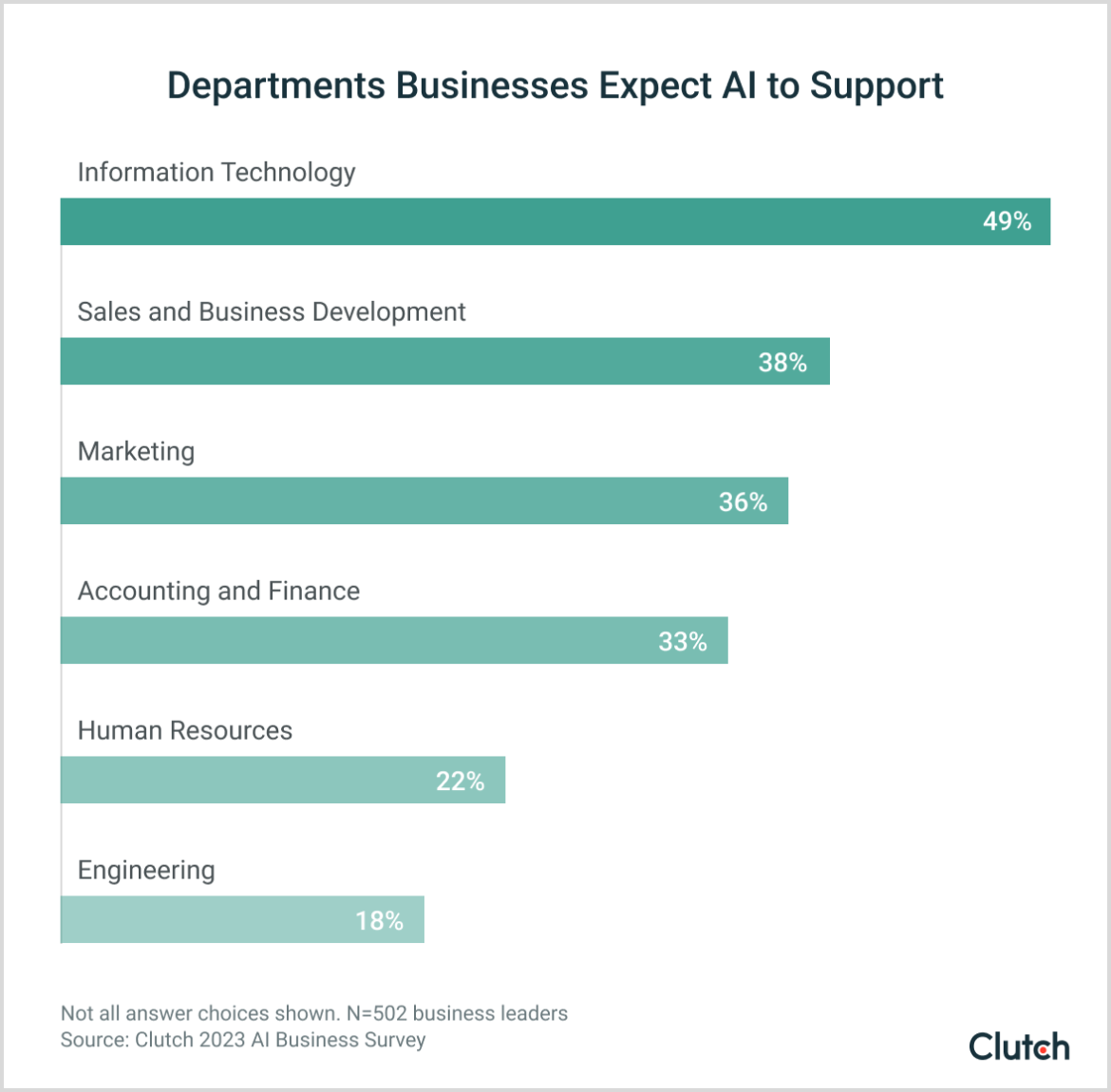
While IT and marketing tasks are already common use cases for small businesses and AI, sales and business development present new opportunities.
Businesses are already using AI to support sales through data enrichment, conversation intelligence, and sales enablement content creation. Additionally, AI is helping businesses develop and improve their customer service chatbots that support sales activities.
Chris Penn, co-founder and chief data scientist at TrustInsights.ai, calls attention to some hidden gem uses for AI that will revolutionize how people do business within the next 1–2 years.
- Transformation of content and data: large language models, in particular, are exceptionally good at synthesis and transformation
- Auditing: the ability for machines to audit complex scenarios and documents better than humans can (GPT-4 successfully audited someone's taxes)
– Chris Penn, TrustInsights.ai
Experts agree that AI will completely change the business world faster than most people think. One way to get ahead of this trend is to identify and implement often-overlooked AI uses for the departments in need of them most.
Do you know the cost of hiring an AI firm? Discover AI services pricing by location and service type before jumping into a custom development project.
Small businesses are just beginning to access and realize the great potential for AI in the workplace.
But, this is only the beginning. AI experts like Paul Roetzer, Founder & CEO of Marketing Artificial Intelligence Institute, predict that AI will need to play a role in every industry for them to remain competitive in the next few years.
“AI is going to be infused into practically every business process. But it won’t take a decade — more like 3–5 years in most industries.” – Paul Roetzer, Marketing Artificial Intellegence Institute
Many small businesses are well on their way to leveraging AI to add value and scale their operations. Don’t get left behind — connect with AI services companies and industry professionals on Clutch to discover what AI can do for your business.
Clutch surveyed 502 small business leaders in the US with experience using AI tools in April 2023. The survey accounts for companies with 1,000 employees and under across a broad cross-section of industries.
Forty-five percent of respondents are owners or founders (45%), 21% hold CEO or President roles, 6% are Vice Presidents, and 28% hold other C-level executive positions.
Thirty-three percent (33%) of respondents’ businesses have 2 to 10 employees; 14% have 11 to 50 employees; 19% have 51 to 250 employees; 17% have 251 to 500 employees; 17% have more than 500 employees.


